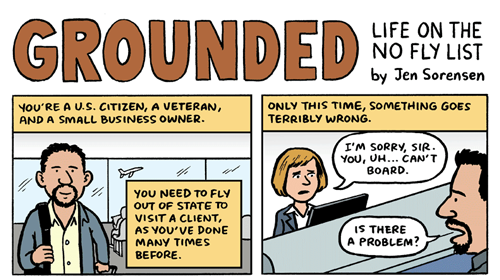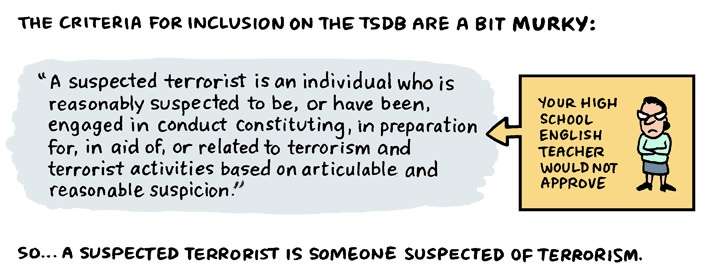Are You on a Terrorist Watchlist Because of a Clerical Error? Good Luck Getting Off.

It would truly suck to end up on some mysterious government list for no clear reason, to be placed under scrutiny. lose freedom, job prospects, and mobility—with no clear process for getting yourself off the roster. Unfortunately, that's the situation in the United States today. Americans can end up on terrorism watchlists because they fit some unknown profile, or even because of malice, or mistake. That's happened to all too many people who, reports the American Civil Liberties Union (ACLU), subsequently found that it was damned near impossible to clear their names.
The no fly list, which bars people from commercial flights, is the most infamous of the watchlists which, together, contained about 875,000 people as of 2012. An ACLU report, U.S. Government Watchlisting: Unfair Process and Devastating Consequences (PDF), details some examples of people who have been listed:
- Marine veteran Abe Mashal's inclusion on the no fly list made it impossible for him to work for clients of his specialized dog training business who lived beyond driving distance, resulting in the loss of significant business income. FBI agents told Mashal that he would be removed from the no fly list if he agreed to become an informant.
- Steven Washburn, an Air Force veteran and New Mexico resident, was prevented for years from being with his wife—a Spanish citizen who was unable to secure a visa to travel to the United States—because of his status on the no fly list.
- Kevin Iraniha, an Iranian-American peace activist, was barred from flying home to San Diego from Costa Rica, where he was studying at the United Nations accredited University for Peace. Iraniha and his father, both of whom were told they had been placed on the no fly list, endured hours of interrogation on their religion, Iraniha's travel to Muslim countries, and his views on Palestine and U.S. foreign policy.
- In April 2012, inclusion on the no fly list prevented Air Force veteran Saadiq Long from flying from Qatar to his childhood home in Oklahoma to visit his mother, whose health had been deteriorating due to congestive heart failure.
How did they get on the no fly list? That's not always clear. But Reason has covered the case of Rahinah Ibrahim, who was listed because an FBI agent filled out a form incorrectly. She then spent years battling in court to clear her name, with federal officials resisting and even lying to the judge in the case every step of the way.
Watch lists aren't just about air travel, either. They can mean scrutiny, civil liberties violations, and constrained options in wide areas of life.
Being placed on a U.S. government watchlist can mean an inability to travel by air or sea; invasive screening at airports; denial of a U.S. visa or permission to enter to the United States; and detention and questioning by U.S. or foreign authorities—to say nothing of shame, fear, uncertainty, and denigration as a terrorism suspect. Watchlisting can prevent disabled military veterans from obtaining needed benefits, separate family members for months or years, ruin employment prospects, and isolate an individual from friends and associates.
That's not to say there are no dangerous peoplle in the world, worthy of scrutiny. But as the report reveals, the federal government "has refused to disclose the standards by which it places individuals" on the list. Perhaps more important, "nor is there any meaningful way to contest one's designation as a potential terrorist and ensure that the U.S. government, and all other users of the information, removes or corrects inaccurate records."
Since we already know that a place on a list can come courtesy of an official's inability to read paperwork directions, that's a bit of a problem.

More fun with watchlists can be found here.
ACLU attorneys go back to court on Monday to argue against the no fly list in the case of Latif v. Holder.


Show Comments (30)